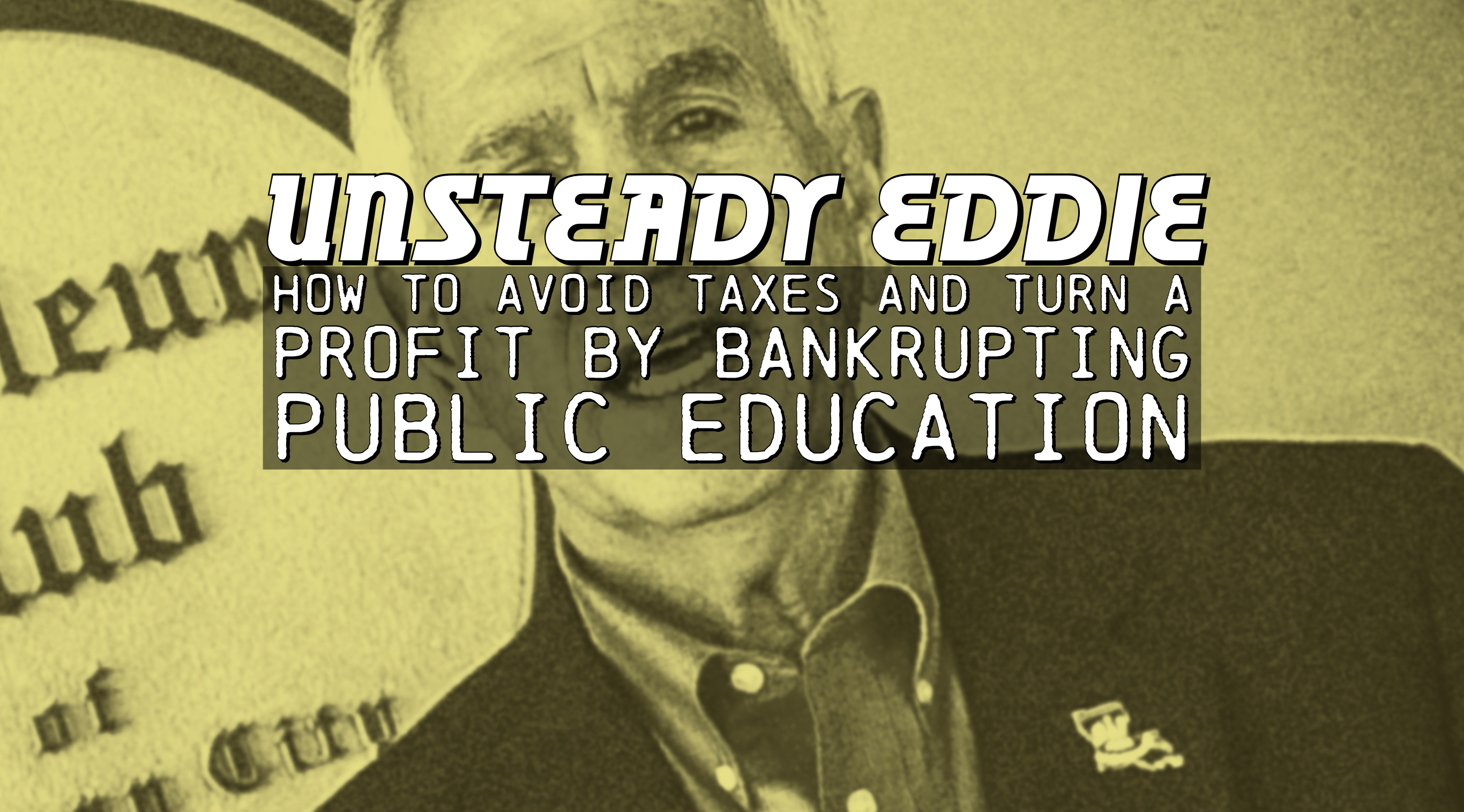If you get Louisiana gubernatorial candidate Eddie Rispone, a 70-year old mega-millionaire construction magnate from Baton Rouge, talking about why he is such a passionate believer in the state’s school voucher program, don’t be surprised if he gets emotional. It’s already happened a few times during his quixotic and nearly entirely self-financed campaign. And if you didn’t know any better, that’d seem endearing- a powerful, wealthy man who just can’t help but get teary-eyed whenever he’s talking about education.
“(Rispone) chokes back tears when describing a drive to try to help thousands of children who attend public schools deemed failing by the state, saying ‘God has asked me to do something about his kids’,” Melinda Deslatte of the Associated Press reported.
But if you are familiar at all with the program, then you may wonder if Rispone, a Republican, is simply channeling his best impression of the state’s most lachrymose stage actor, Jimmy Swaggart. Because if you’re going to express any emotion over school vouchers in Louisiana, the only appropriate response would be anger.
Even Secretary of Education Betsy DeVos, the nation’s biggest cheerleader of so-called “school choice” initiatives, acknowledges Louisiana’s voucher program is a failure. “I would just say that the Louisiana program was not very well conceived. It has encouraged some schools that probably would not have been parents’ first choices if they’d been given a full range of choices,” she said last month.
There are compelling reasons to believe that Rispone’s emotional investment in the school choice program is more about a rich man being publicly emotional about his private investments than about an earnest belief in a voucher program so bad that even Betsy DeVos has distanced herself from it.
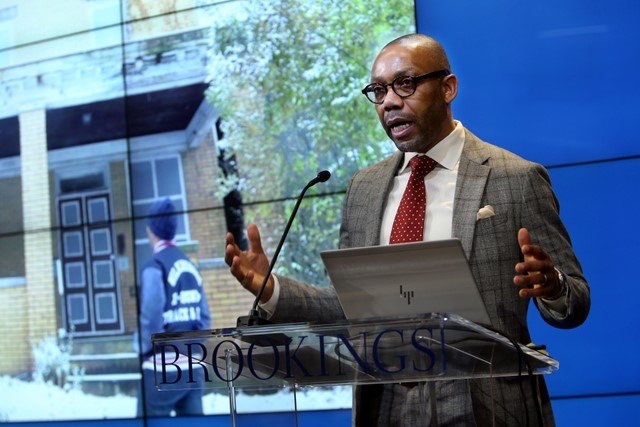
“This has nothing to do with education,” Dr. Andre Perry, a Brookings Institute fellow who has spent his entire career studying race, structural and institutional inequality, and education policy, tells me, after I describe to him the details of Rispone’s central role in developing the state’s little-known and rarely-used Tuition Donation Credit Program.
In simple terms, the program potentially allows Rispone to not only zero out his state income tax liability but also to reduce his federal tax exposure by hundreds of thousands of dollars every year.
I first met Perry five years ago when he was working as an Associate Director of an initiative at Loyola University in New Orleans, assessing and researching post-Katrina educational reforms and their impact on marginalized communities. His upcoming book, scheduled for publication in January of 2020, is titled Know Your Price: Valuing Black Lives and Property in America’s Black Cities. There are few, if any, who understand the realities and consequences of education “reform” policies enacted primarily during the Jindal administration better than Perry, and for reasons I will explain soon, Perry is right to be skeptical about the real reason Eddie Rispone is so passionate and emotional about a relatively small voucher program that has performed abysmally.
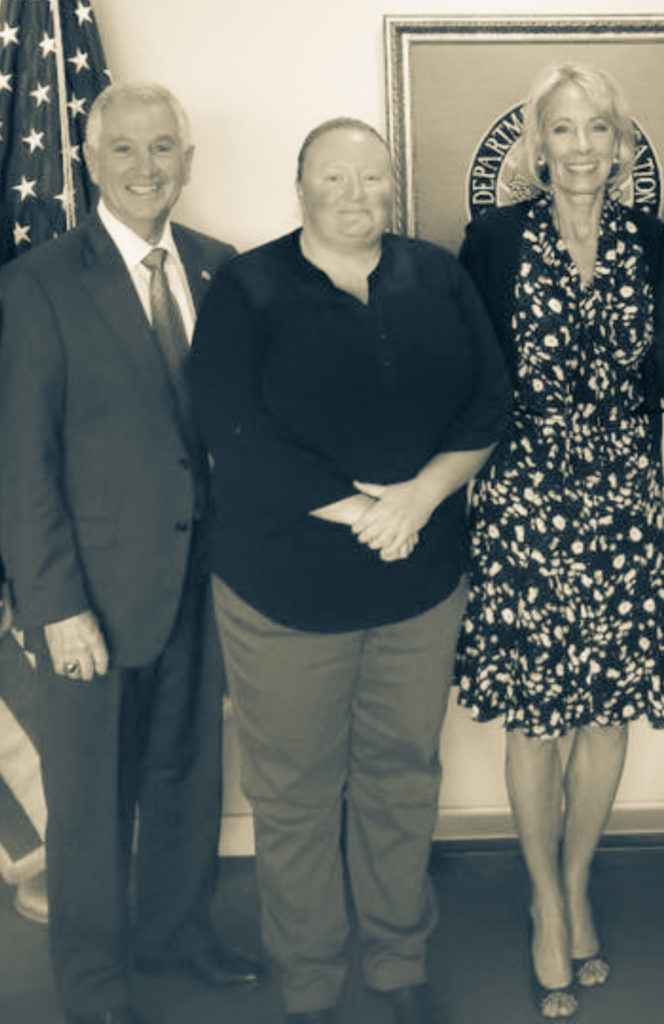
I imagine things may have become a little awkward between the embattled Education Secretary and the wealthy businessman with a direct line to God when DeVos, uncharacteristically, criticized Louisiana’s program.
Because with the exception of former Gov. Bobby Jindal, Eddie Rispone is more responsible than anyone else in championing the state’s voucher program. He’s dumped an enormous fortune underwriting pop-up advocacy groups promoting school choice.
In 2011, a year before Jindal signed the school voucher program into law, Rispone and his wife spent $750,000 producing a school choice documentary titled “The Experiment.” The film’s trailer begins in New Orleans with the image of a dead body of a black man being covered with a tarp, immediately exploiting a family’s tragedy as a way of introducing a movie that is, ostensibly, about school choice. The filmmakers also manage to sneak in interviews with two of Louisiana’s most prominent Democrats, former Gov. Kathleen Blanco and James Carville, leaving viewers with the mistaken impression they both were supportive of privatizing public education when, in reality, they were simply commenting on the ways in which Hurricane Katrina forced leaders to consider different ways of investing in public education after the city had to confront what had been, at the time, how to best recover.
Recently, a collaborative investigative series on Louisiana’s school voucher program by Fox 8, the Times-Picayune, WWNO, and the Center for Investigative Journalism- “The Cost of Choice”- emphasized Sec. DeVos’ comments, which were, without question, newsworthy. The problem is that we knew it “was not very well conceived” from the very beginning, when Bobby Jindal declared it to be the largest and most ambitious school voucher program in the nation and the Wall Street Journal gushed that it was Gov. Jindal’s “Education Moon Shot.”
While “The Cost of Choice” series deserves to be seen by anyone in Louisiana who is concerned about education policy, it primarily served as a reminder of how little the story has changed since the program was signed into law in 2012, and it’s refreshing that the program has received renewed scrutiny. During its first three years, Louisiana’s program had continually attracted significant national attention, though since then, the program has largely remained out of view. Former Gov. Jindal failed to make it the most expansive voucher program in the nation, and fortunately, it’s languished.

The whole experiment was and still is a complete farce, a cynical effort by an embattled and deeply unpopular governor to stage a theatrical performance billed as the kind of red meat he had hoped would persuade Iowans to support him in the Republican presidential caucus. As I once wrote in the online publication Salon, Jindal had hoped to recruit a network of homeschooled teenagers and their parents to operate his ground game in Iowa. Obviously, that didn’t work out as planned.
Following the 2015 statewide elections, the new governor, John Bel Edwards, did not enjoy the type of influence over the state education policy as Gov. Jindal had, not because Edwards shirked from those responsibilities but because an unprecedented and coordinated surge of spending by wealthy advocates of expansive school choice polices ensured the Board of Elementary and Secondary Education (BESE) remained narrowly in the control of the very group of people responsible for helping Jindal create this fiasco. Eddie Rispone and his wife personally sank $200,000 to help elect a slate of pro-school choice BESE members.
I’ve been covering the Louisiana voucher program from its inception, and it’s one of the primary reasons my work eventually gained a statewide and, occasionally, a national audience. Yet until I began digging into Eddie Rispone’s crucial behind-the-scenes role and machinations, I’d believed, perhaps naively, that the difference of opinions on school vouchers were animated by simple ideological and religious differences.
Advocates of “school choice” usually frame the issue around a type of libertarian rhetoric about religious freedom, but the messaging around school vouchers has always been much more problematic and complicated, often specifically targeting African-Americans by attempting to diminish the schools that have historically been sources of cultural pride and identity and objectifying the lives of people in those communities.
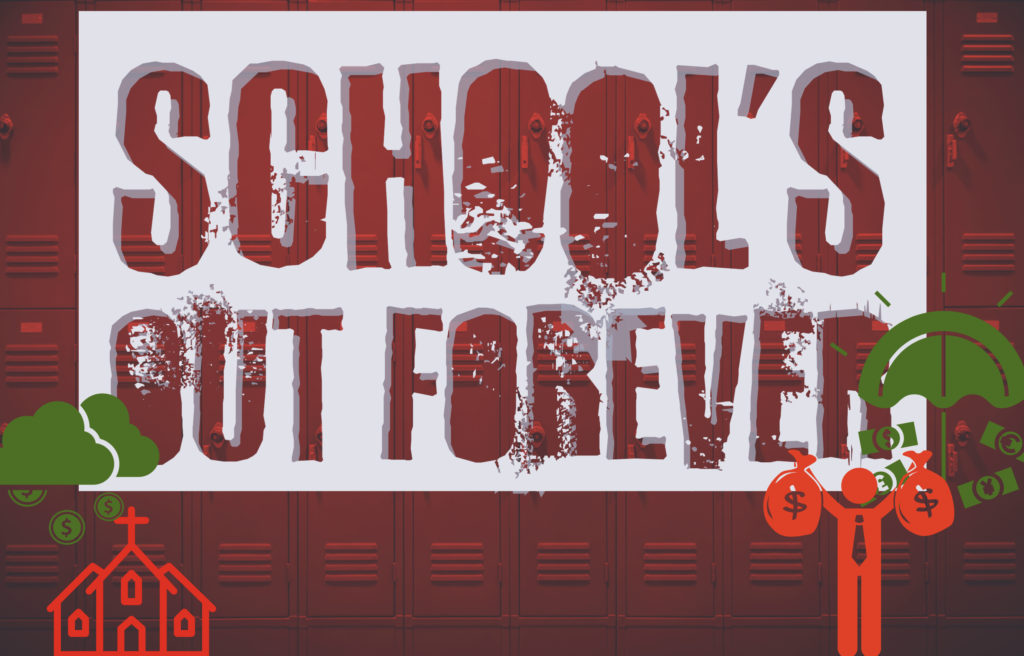
Recently, during a campaign event at T.J. Ribs in Baton Rouge, Rispone admitted to the audience that he had, in fact, been the benefactor of the television commercials that aired during the very beginning of John Bel Edwards’ first term featuring an African American woman who stared directly into the camera and called the governor a liar for daring to propose a cut in funding to the voucher program.
At the time, the state was confronting a $1.6 billion shortfall, and due to the intransigence and the gamesmanship of a small contingency of far-right partisan Republicans in the state House, nearly all of whom were taking their cues from U.S. Rep. Steve Scalise and former U.S. Sen. David Vitter, the state had been left with no alternative but to propose across-the-board cuts, including significant reductions for programs vastly more important and consequential than ensuring we paid for a child to attend a private school with the name Saint or Academy in it than a public school that didn’t sound as prestigious, even if it offered a better education.
With the state on the brink of falling over the fiscal cliff due to the negligence and wanton mismanagement of the Jindal administration, this is how Eddie Rispone decided to spend hundreds of thousands of dollars:
The commercial features a 55-year-old woman from Kenner named Coretta Pittman who stares directly into the camera and complains about the possibility of losing school vouchers for her young children. Unwittingly, Ms. Pittman reveals herself to be either a paid actor or an completely ignorant about the school her children actually attend.
It earned a D grade from the state.
So, the questions remain: Why does Eddie get so unsteady and emotional about this particular program? How is it that a wealthy white conservative who spends a fortune promoting candidates who oppose healthcare expansion and are supportive of initiatives like the Industrial Tax Exemption Program are hyperbolically supportive of a failed voucher program that takes resources away from struggling public schools in order to prop up even worse private schools?
There is, in fact, a simple answer, and unless Eddie Rispone’s wealth manager is nicknamed God, it has nothing to do with any message he’s received from the Almighty.
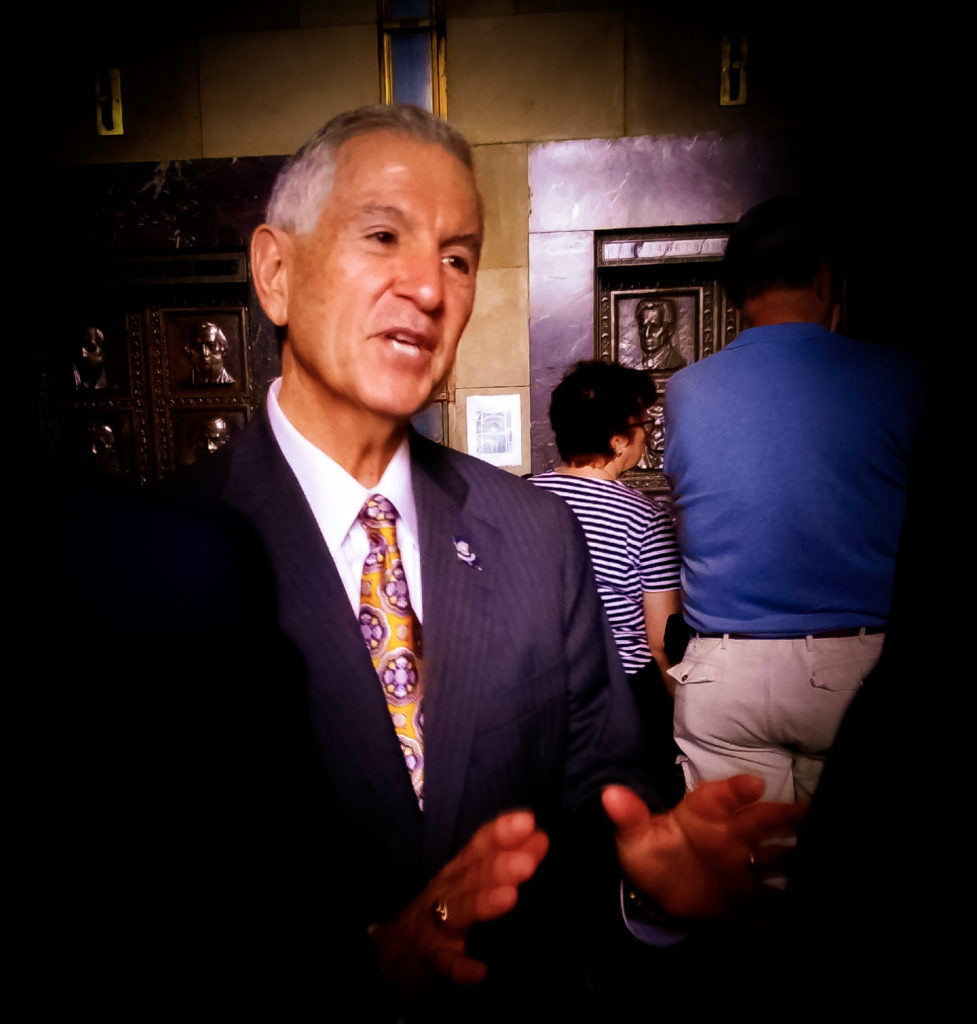
You see, Eddie Rispone, when he served as Chairman of the Louisiana Federation for Children, was directly responsible for promoting and helping to pass an amended tax scheme that allowed him to avoid paying 95% of his state income taxes, ensuring that nearly every dime he donates to a parochial voucher school is eventually given to the school instead of to the state. Initially, the law treated such donations as a deduction (though they called it a rebate); today, it’s a tax credit.
But regardless, the programs both also allow him to write off the remaining 5% as a tax-deductible charitable donation and therefore, due to a rule change under the Trump Tax Plan, avail himself of an enormous discount on his federal taxes.
I have written about the scam scheme before, in a report published in April of 2018 titled “In Louisiana, there’s a way for the wealthy to avoid paying state income taxes.”
In Rispone’s particular case, here’s an example of how it works:

In December of
While we do not know Rispone’s income or how much of his donation was used toward scholarships, it’s possible to estimate how much Rispone could have profited off his $1 million donation. If Rispone’s entire donation was used for scholarships in 2015, assuming Rispone did not donate more than 50% of his annual gross income and that he was in the highest income bracket (36.9% marginal tax rate), Rispone’s donation qualified him for up to a $950,000 rebate from the State of Louisiana and a federal tax savings of $369,000.
Therefore, his $1 million donation had a potential return of $1,319,000 ($950,000 + $369,000) for a profit of $319,000. (Incidentally, Rispone’s company earns approximately $350 million a year, and personally earns just 5% of that revenue, his state income tax liability would be around $1 million).
No wonder the subject makes him weepy.
According to the American Association of Superintendents, Louisiana’s program may be terrible for the state and may not have anything substantive to do with education, and it ranks dead last.
“People like Rispone seem more interested in self-hoarding their wealth than improving education,” Andre Perry tells me. “Any state (as poor as Louisiana) needs revenue and should not have laws like these on their books.”

